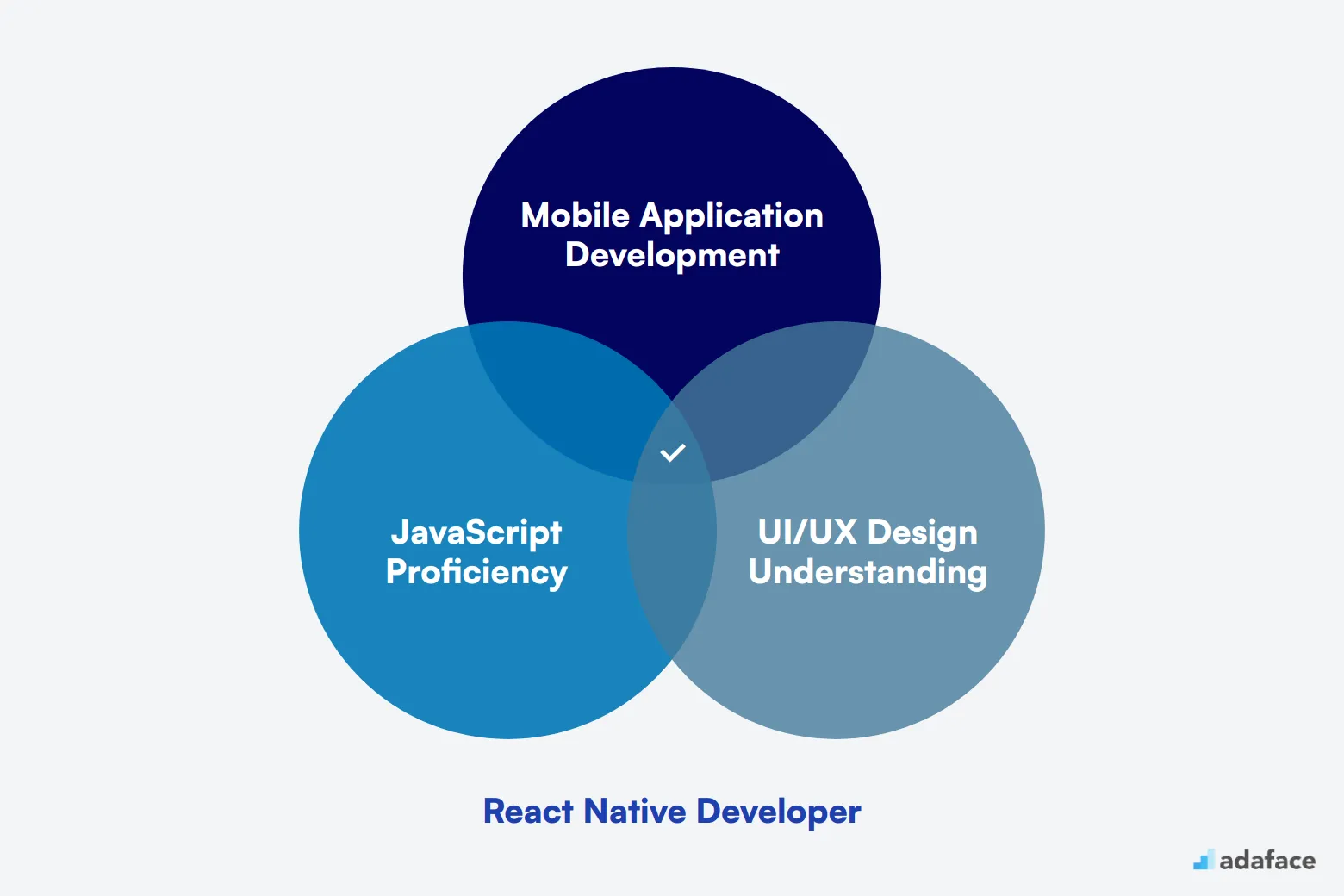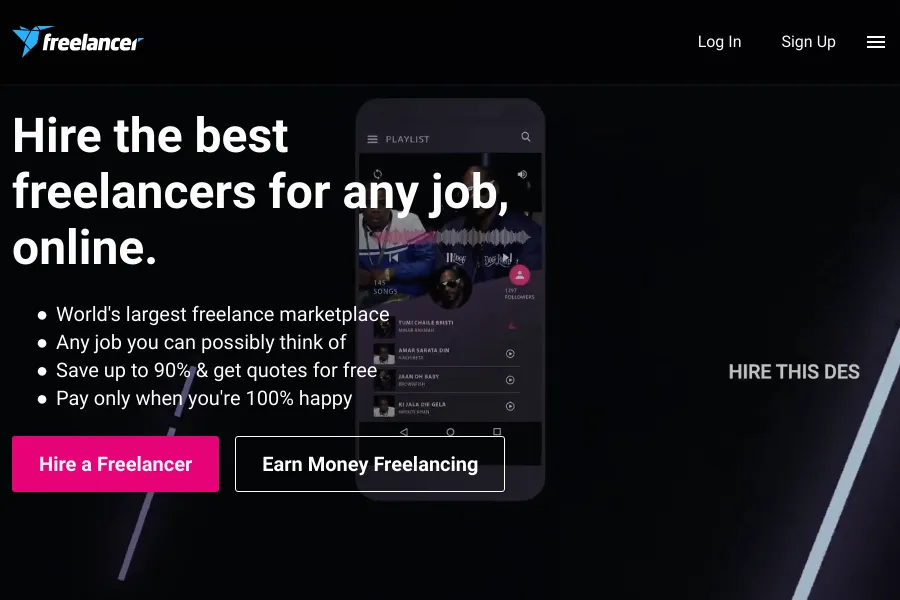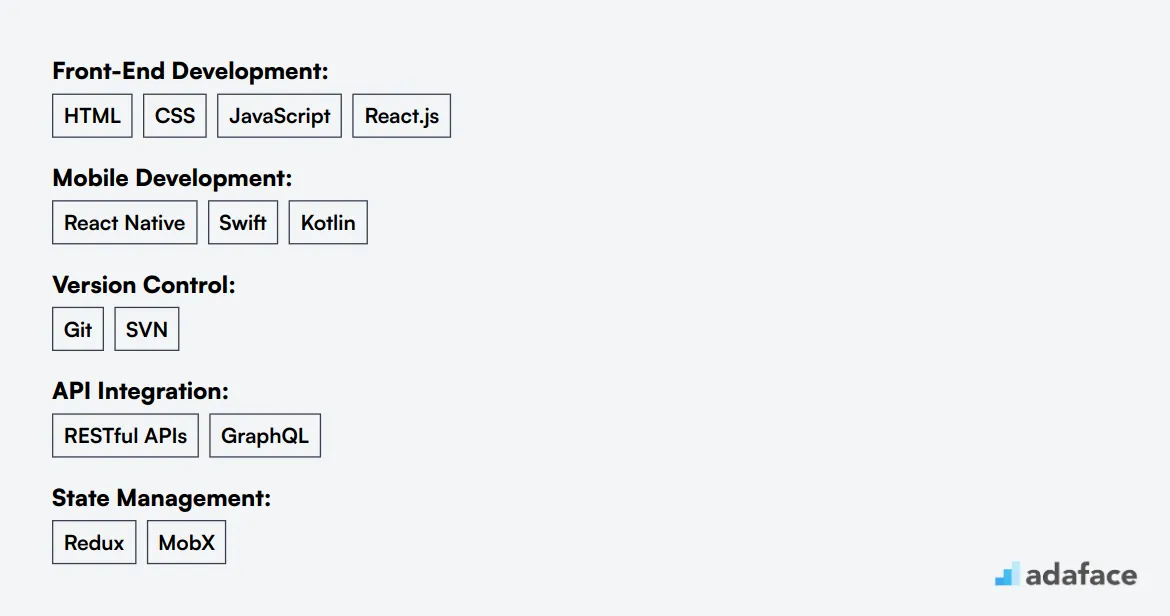Hiring React Native developers can be a challenge for recruiters and hiring managers. Many companies struggle to find candidates with the right mix of technical skills, experience, and cultural fit. The fast-paced nature of mobile app development means that the ideal React Native developer needs to be adaptable, quick to learn, and able to work efficiently in a team environment.
This comprehensive guide will walk you through the process of hiring top-tier React Native talent. We'll cover everything from defining the role and required skills to conducting effective interviews and making the final selection. For a deeper dive into React Native skills assessment, check out our React Native online test.
Table of contents
Why Hire a React Native Developer?
React Native developers are in high demand due to the growing popularity of cross-platform mobile app development. They can help your company create mobile apps that work on both iOS and Android platforms using a single codebase, potentially saving time and resources.
Consider hiring a React Native developer if you're facing challenges like:
- Need to quickly launch a mobile app for multiple platforms
- Want to maintain a consistent user experience across different devices
- Looking to reduce development costs and time-to-market
Before committing to a full-time hire, assess your project scope and timeline. For short-term or experimental projects, you might start with a freelance React Native developer or consulting firm. For long-term app development and maintenance, bringing a full-time React Native expert on board could be more beneficial.

What Does a React Native Developer Do?
A React Native developer creates mobile applications that work seamlessly on both iOS and Android platforms. They use the React Native framework, which allows for efficient development of cross-platform apps with a native look and feel.
The day-to-day tasks of a React Native developer include:
- Writing clean, maintainable JavaScript code
- Implementing user interface components
- Integrating APIs and third-party libraries
- Optimizing app performance
- Debugging and fixing issues
- Collaborating with designers and backend developers
- Staying updated with the latest React Native trends and best practices
React Native Developer Hiring Process
The React Native developer hiring process typically spans 4-6 weeks. Here's a quick overview of the timeline:
- Post a well-crafted job description on relevant platforms
- Review incoming resumes (3-5 days)
- Conduct skill assessments or coding tests (5-7 days)
- Schedule and complete interviews (1-2 weeks)
- Make an offer to the best candidate (2-3 days)
This process can be adjusted based on your company's needs and the candidate pool. In the following sections, we'll dive deeper into each step, providing checklists and resources to help you find the perfect React Native developer for your team.
Skills and qualifications to look for in a React Native Developer
Creating an ideal candidate profile for a React Native Developer can be tricky. The key is to distinguish between must-have skills and nice-to-have qualifications. This approach helps you focus on candidates who can hit the ground running while still leaving room for growth and specialization.
Required skills typically include strong JavaScript proficiency, React Native experience, and familiarity with mobile app development lifecycles. On the preferred side, you might look for experience with native iOS or Android development, or knowledge of state management tools like Redux.
Remember, technical skills are just part of the equation. Soft skills like problem-solving and communication are equally important for a developer who will likely collaborate with various teams.
Here's a quick breakdown of skills to consider:
| Required skills and qualifications | Preferred skills and qualifications |
|---|---|
| Two or more years of experience in React Native development | Bachelor's degree in Computer Science or related field |
| Proficiency in JavaScript and React framework | Experience with native mobile app development (iOS/Android) |
| Experience with RESTful APIs and third-party libraries | Knowledge of Redux or other state management tools |
| Familiarity with code versioning tools, such as Git | Experience with CI/CD pipelines |
| Understanding of mobile application lifecycle and performance tuning | Strong problem-solving and debugging skills |
How to write a React Native Developer job description?
Crafting an effective job description is the next step after you have identified the ideal candidate profile. This description should clearly articulate the role to attract the right talent.
- Highlight key responsibilities and impact: Outline the core responsibilities of the React Native Developer and how their work will contribute to the overall success of your projects. This helps candidates understand the significance of their role within your team.
- Balance technical skills with soft skills: While it's important to list the required technical skills, such as expertise in React Native and familiarity with mobile development frameworks, don't forget to mention essential soft skills. Traits like teamwork, adaptability, and communication are equally important for a successful hire.
- Showcase your company and role's unique selling points: Emphasise what sets your company apart—whether it's innovative projects, a collaborative culture, or growth opportunities. This can make your job offer more attractive compared to others in the market.
For a more detailed framework, consider using our React Native Developer job description as a reference.
10 platforms to hire React Native Developers
Now that you've crafted a compelling job description, the next step is to post it on various job listing sites to attract React Native developers. This strategic approach will help you reach a broad pool of talented candidates, streamlining the hiring process.
Upwork
Ideal platform for hiring freelance developers on a project basis. Suitable for short-term and long-term freelance needs.

Freelancer
Useful for finding freelancers for specific projects or tasks. Good for flexible and varied budget options.

Best for hiring full-time employees by leveraging professional networks and connections. Suitable for permanent positions.

Among the remaining platforms, LinkedIn stands out for hiring full-time employees through professional networks, while AngelList is perfect for startups seeking tech-savvy developers. Stack Overflow Jobs targets developers with strong technical skills, appealing to a tech-focused audience. For remote opportunities, consider Toptal and Remote OK, each offering a unique edge in sourcing top-tier remote developers. Additionally, Fiverr and Guru provide a variety of freelance options, catering to different project needs and budget constraints. These platforms offer diverse solutions for finding developers, whether for full-time, freelance, or remote roles.
Keywords to Look for in React Native Developer Resumes
Resume screening is a time-saving step in the hiring process. It helps you quickly identify candidates with the right skills and experience for your React Native developer role.

When manually screening resumes, focus on key technical skills like React Native, JavaScript, and mobile app development. Look for experience with RESTful APIs, version control systems like Git, and state management tools such as Redux.
To streamline the process, consider using AI-powered tools like ChatGPT or Claude. These can help you quickly assess multiple resumes based on predefined criteria and keywords.
Here's a sample prompt for AI-assisted resume screening:
TASK: Screen resumes for React Native Developer role
INPUT: Resumes
OUTPUT:
- Candidate Name
- Matching keywords
- Score (out of 10)
- Recommendation
- Shortlist (Yes/No/Maybe)
KEYWORDS:
- React Native
- JavaScript
- Mobile App Development
- RESTful APIs
- Git
- Redux
Customize this prompt based on your specific React Native developer job requirements.
Recommended Skills Tests to Screen React Native Developers
Hiring a proficient React Native Developer requires more than just a review of resumes. Skills tests offer a straightforward way to evaluate a candidate's expertise in specific areas, ensuring you get the right talent for the job. Here are some recommended skills tests to help you assess potential candidates:
React Native Online Test: This test is tailored to assess a candidate's understanding of React Native fundamentals, including component lifecycle, hooks, and state management. It's pivotal for evaluating their practical experience with the framework.
JavaScript Online Test: As React Native heavily relies on JavaScript, this test is crucial in determining the candidate's proficiency with JavaScript concepts like ES6+, asynchronous programming, and object-oriented programming.
TypeScript Online Test: Given the increasing use of TypeScript in React Native projects, this test measures the candidate's ability to work with static types, interfaces, and other TypeScript features.
Git Test: Understanding version control is essential for any developer. This test examines the candidate's grasp of Git commands and workflows, ensuring they can collaborate seamlessly within a development team.
Node.js Test: Often used in conjunction with React Native for backend tasks, this test checks the candidate's knowledge of Node.js, including understanding of asynchronous code and basic server-side scripting.
Case Study Assignments to Hire React Native Developers
Case study assignments can be valuable for assessing React Native developers' skills. However, they come with drawbacks like lengthy completion times, low participation rates, and the risk of losing good candidates. Let's explore some effective case studies that balance thoroughness with practicality.
Build a Simple News App: This assignment tasks candidates with creating a basic news application using React Native. They should fetch data from a public API, display articles in a list, and implement a detail view. This project tests their ability to work with APIs, manage state, and create a smooth user interface.
Implement a Chat Feature: Candidates are asked to add a real-time chat functionality to an existing React Native app. This project evaluates their skills in working with WebSockets, managing real-time data, and integrating third-party libraries. It's an excellent way to assess their problem-solving abilities and knowledge of mobile app development.
Optimize App Performance: In this assignment, developers are given a poorly optimized React Native app and asked to improve its performance. They should identify and fix issues like unnecessary re-renders, memory leaks, and slow animations. This case study tests their debugging skills and deep understanding of React Native's internals.
Structuring the Interview Stage for React Native Developers
After candidates pass the initial React Native skills tests, it's time for technical interviews. These interviews are key to assessing a candidate's practical skills and problem-solving abilities. While tests filter out unqualified applicants, interviews help identify the best fit for your team.
Consider asking these questions during the interview: 1) Explain the difference between React and React Native. 2) How do you handle state management in React Native? 3) Describe your experience with native modules. 4) How do you optimize performance in React Native apps? 5) Can you walk us through your process for debugging React Native issues? These questions probe the candidate's understanding of React Native fundamentals, state management, native integration, performance optimization, and troubleshooting skills.
What's the difference between a React Native Developer and a React Native Architect?
Many recruiters often confuse the roles of a React Native Developer and a React Native Architect, as both positions involve React Native technology. However, they serve distinct purposes within a project, which can lead to misunderstandings about their responsibilities and skill sets.
A React Native Developer typically has 2-5 years of experience and focuses on app development, working on individual features or components. They possess skills like React Native, JavaScript, and Redux, and are responsible for implementation-level decisions within their immediate team. Their salary generally ranges from $80,000 to $120,000.
In contrast, a React Native Architect has over 5 years of experience and is responsible for system design and architecture. They work on the entire application structure and make strategic technical decisions, often interacting extensively with management and clients. Their advanced technical skills include system architecture and performance optimization, and they command a higher salary ranging from $120,000 to $180,000+.
| React Native Developer | React Native Architect | |
|---|---|---|
| Experience Level | 2-5 years | 5+ years |
| Primary Focus | App development | System design and architecture |
| Technical Skills | React Native, JavaScript, Redux | Advanced React Native, system architecture, performance optimization |
| Project Scope | Individual features or components | Entire application structure |
| Decision Making | Implementation-level decisions | Strategic technical decisions |
| Team Role | Individual contributor | Technical leader |
| Stakeholder Interaction | Limited, mostly with immediate team | Extensive, including management and clients |
| Salary Range | $80,000 - $120,000 | $120,000 - $180,000+ |
What are the ranks of React Native Developers?
React Native developers often have varying levels of expertise and experience. Understanding these ranks can help recruiters and hiring managers find the right fit for their team's needs.
- Junior React Native Developer: This entry-level position is for those with basic knowledge of React Native and JavaScript. They typically work on simpler tasks and require guidance from more experienced team members.
- Mid-level React Native Developer: These developers have a few years of experience and can work independently on most projects. They possess a deeper understanding of React Native concepts and best practices.
- Senior React Native Developer: With extensive experience, senior developers lead complex projects and mentor junior team members. They have a comprehensive understanding of the React Native ecosystem and can architect large-scale applications.
- React Native Architect: This top-tier position involves designing system-wide solutions and making high-level technical decisions. React Native Architects often have 8+ years of experience and a broad knowledge of mobile development.
- React Native Tech Lead: Tech Leads combine technical expertise with leadership skills. They oversee development teams, set technical direction, and ensure project success while still contributing to code.
Hire the Best React Native Developers
In our journey through hiring React Native Developers, we've explored key elements like crafting a comprehensive job description, identifying essential skills and qualifications, and utilizing various platforms for recruitment. Understanding the ranks and roles of developers ensures you know exactly what level of expertise you need for your project.
If there's one key takeaway, it's the importance of using well-defined job descriptions and targeted skill assessments to make informed hiring decisions. Implementing React Native online tests can greatly aid in evaluating a candidate's compatibility with your needs. By prioritizing these aspects, you'll enhance your chances of finding the right fit for your team.
React Native Online Test (React Native + JavaScript)
FAQs
Key skills for React Native developers include proficiency in JavaScript, experience with React and React Native frameworks, knowledge of mobile app development principles, familiarity with native iOS and Android development, and strong problem-solving abilities. For a comprehensive list, visit our skills required for React Native developer page.
You can assess technical skills through coding tests, technical interviews, and portfolio reviews. Consider using our React Native online test to evaluate candidates objectively. Additionally, practical coding assignments and whiteboard sessions can help gauge problem-solving abilities.
Ask questions about their experience with React Native, challenges they've faced in previous projects, their approach to optimizing app performance, and how they stay updated with the latest React Native developments. For a list of specific questions, check out our React Native developer interview questions.
An effective job description should clearly outline the role responsibilities, required technical skills, desired experience level, and any specific project requirements. It should also highlight your company culture and benefits. For a template, see our React Native developer job description guide.
You can find React Native developers on job boards, tech-specific platforms like GitHub and Stack Overflow, LinkedIn, and through referrals. Additionally, consider attending tech meetups, conferences, and hackathons focused on mobile app development or React Native specifically.
The hiring process for a React Native developer can take anywhere from 2-8 weeks, depending on your company's hiring practices, the urgency of the role, and the availability of qualified candidates. Streamlining your process with effective screening tools and clear communication can help reduce this timeline.
While both use React, React Native developers specialize in building mobile applications that can run on both iOS and Android platforms. React developers, on the other hand, typically focus on web applications. React Native developers need additional knowledge of mobile app development principles and native platform capabilities.

40 min skill tests.
No trick questions.
Accurate shortlisting.
We make it easy for you to find the best candidates in your pipeline with a 40 min skills test.
Try for freeRelated posts
Free resources



